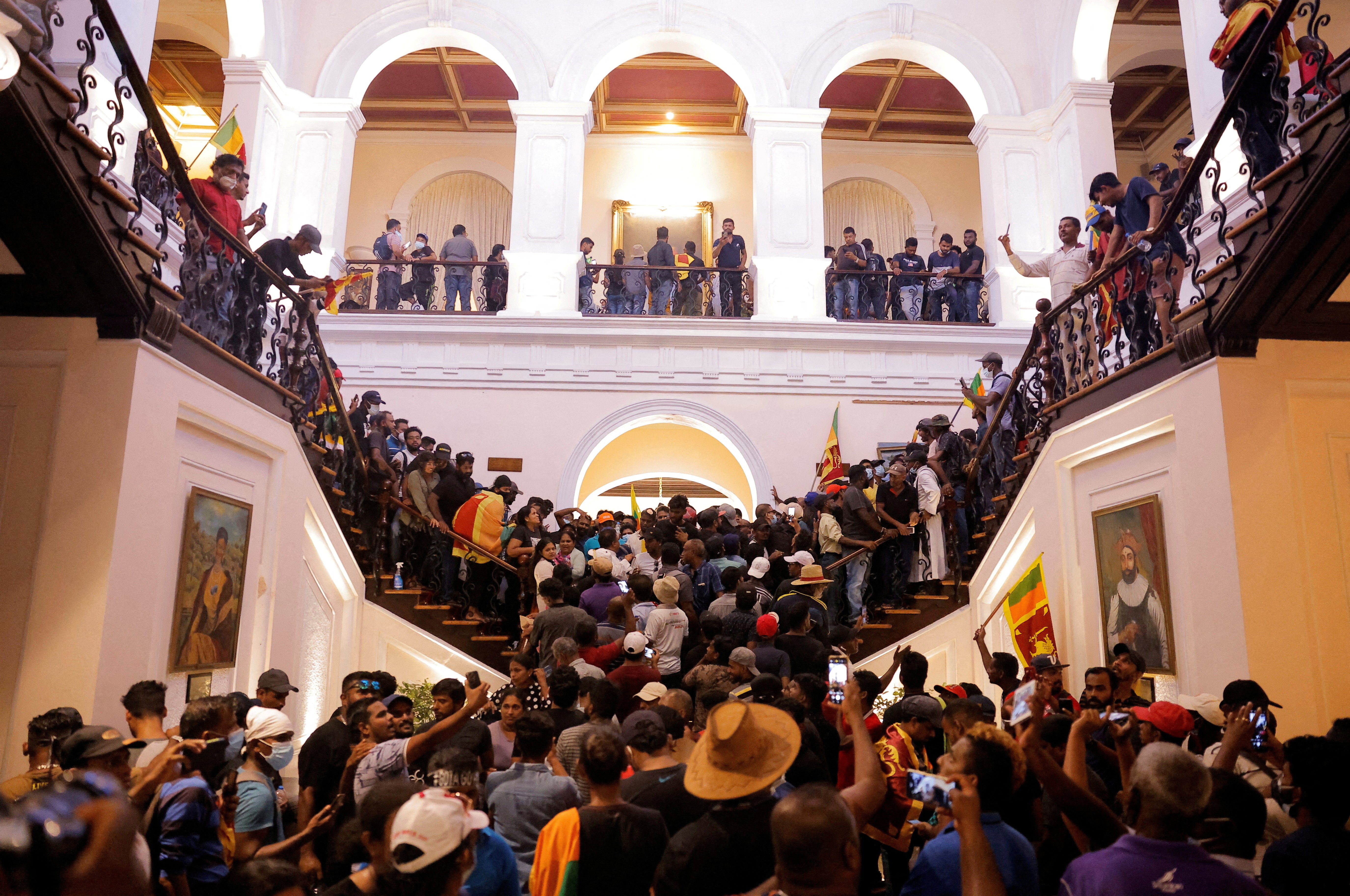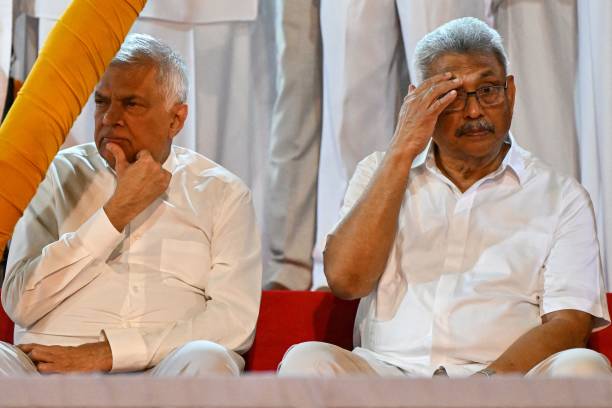One year after a popular uprising ousted its president, has Sri Lanka changed for the better?
An economic lifeline could ease foreign debt, soaring prices, and shortages of essential goods – but there is a human cost, experts tell Namita Singh


It was an economic crisis that escalated into a dramatic popular uprising. Thousands of Sri Lankans took to the street, storming president Gotabaya Rajapaksa’s palace and looting treasures.
Citizens from across the island nation of 22 million boarded buses and trains to descend on Colombo with chants of “Go home Gota” as they demanded Rajapaksa’s resignation amid soaring prices, shortages of essential goods, and crippling international debts.
One year on since Rajapaksa finally heeded their calls and stepped down, Sri Lanka is undoubtedly in a better economic position. But activists say growing political and financial stability have come at the cost of a slide in civil rights, incomes for the poorest in society and the long-term health of many, particularly women.
After resigning on 13 July 2022, Rajapaksa named the former prime minister Ranil Wickremesinghe as his successor. This was hardly the root-and-branch change of leadership called for by demonstrators, and indeed the government under Wickremesinghe has been accused of intimidating and arresting activists involved in the uprising, with dozens of protesters detained and questioned by the police.
While the International Monetary Fund (IMF) provided the country with a lifeline by extending a $3bn bailout package, experts tell The Independent that the government still needs to implement more drastic economic measures if it is to put the country back on the road to growth. It’s a challenge given that the number of people living below the poverty line in Sri Lanka doubled in 2022.
“The IMF provided financial support through the extended fund facility (EFF) that was initially promised in September. It took quite a lot of time to actually be implemented,” explains Aditya Gowdara Shivamurthy, a research fellow at Delhi’s Observer Research Foundation.
“It took about six to seven months and was finally implemented in March 2023. However, the main objective of the IMF fund facility was not to boost Sri Lanka’s foreign direct investment but rather to provide a sense of economic stability to the country that had declared itself bankrupt.”
The crisis had forced Sri Lanka to preemptively default on foreign debts amounting to $51bn in April 2022. The country’s GDP was falling by 7.8 per cent in 2022, and year-on-year inflation rose to 69.8 per cent by September 2022.

The government stabilisation measures had to begin imminently, explains Dr Ganeshan Wignaraja, a senior research associate with the UK-based Overseas Development Institute, as he credits Wickremesinghe for calming the political turbulence.
“First, and foremost, he got political stability,” says the economist. “I was here [in Sri Lanka] during this whole crisis, there were protests, there was a real risk of civilian unrest. The popular uprising was largely by ordinary people.
“But now we are in a scenario where ordinary people can go about their business and live their daily lives. So that’s a huge change compared to what it was last year. And that is something people give him credit for.”

Concrete stabilisation measures brought in by the president included significantly tightening monetary policy to control spiralling inflation, raising taxes, removing fuel and electricity subsidies, and the privatisation of state-owned enterprises (SOEs) including Sri Lankan Airlines, Sri Lankan Telecom, and Sri Lanka Insurance.
Wickremesinghe also intensified talks with Sri Lanka’s bilateral creditors on debt restructuring, as the country sought a much-anticipated IMF bailout package.
“And for that, he used his ability to talk to international organisations to really bring the IMF into the picture,” says Wignaraja, explaining that “credit does not mean you get the programme”.
The IMF’s initial funding has certainly helped the economy to stabilise, says Sri Lankan political economic analyst Asanga Abeyagoonasekera. “Inflation was about 70 per cent last year, and now it’s at 12 per cent. And remittances have grown, and reserves are increasing. The IMF [funding] will help to win back the confidence the country lost due to past policy missteps by Gotabaya Rajapaksa’s autocratic rule.”
But the fallout from the unprecedented economic crisis persists, with ongoing impacts from the pandemic and the Russia-Ukraine crisis, and growth remains elusive. According to data published by the World Bank in April 2023, national poverty in Sri Lanka is estimated to have doubled to 25 per cent in 2022 from 13.1 per cent in 2021, adding 2.5 million people below the poverty line. It is expected to increase to 27.5 per cent in 2023.
The Wickremesinghe government says it wants to protect social expenditure and restructure social programmes to target those in need. However, these transitions take time, and the impact on vulnerable populations is still being felt, drawing concern from international organisations, including Amnesty International.
“Due to the severity of the economic crisis in Sri Lanka, health and nutrition have taken a back seat,” says Dinushika Dissanayake, Amnesty International’s deputy regional director for South Asia. “The situation has taken a grave toll on the health and wellbeing of pregnant and breastfeeding women. These individuals have also been disproportionately impacted by the crisis, which has seen poverty rates double in the space of a year due to the crisis.”
Sri Lanka’s public health system has also been affected by shortages of medicine and equipment. Health workers providing maternal care told Amnesty that they had to stop, delay or postpone non-essential surgeries and procedures. One doctor, who said they have to ration drugs for emergency cases because future supplies are uncertain, told the international NGO: “We have to see patients suffering and we cannot do anything.”
The agency found that health workers reused equipment or told patients to purchase medicine or equipment from private pharmacies because state-run hospitals had run out. Meanwhile, medicines in private pharmacies remained unaffordable to most due to price hikes and the devaluation of the Sri Lankan rupee.
Lawyers, activists, and legal scholars have also raised concerns about the government’s handling of human rights, with accusations of crushing protests using its draconian Prevention of Terrorism Act which allows arbitrary arrests and prolonged detention without trial.
Despite repeated assurances, the law introduced nearly four decades back in 1978 and widely misused – leading to disappearances and deaths in custody of both Tamil and Sinhala youths – is yet to be repealed.
While the government proposed a separate Anti Terrorism Bill to parliament earlier in March this year, it was rolled back following a huge outcry over the inclusion of crimes such as property damage, theft, or robbery, in the definition of terrorism.
It also restricted the rights of freedom of assembly and speech, giving broad powers to detain people without evidence without meaningful judicial oversight.
While Wickremesinghe had earlier pledged to back the popular protests, soon after taking office he described the protesters as “fascists”, using full state machinery to clamp down on dissent.
It started with him authorising the military to clear part of a protest camp on 22 July and claim the presidential secretariat building, leading to at least 50 people being injured. More than 100 people were arrested soon after, while police raided homes of protesters and picked up activists off the streets, questioning them for hours, reported The Guardian.
In September last year, police arrested 84 protesters, including activists of the radical Socialist Youth Front, for taking part in a march against the government.
“I encourage the government to repeal the Prevention of Terrorism Act,” said the Office of the UN High Commissioner for Human Rights in its statement issued on 21 June this year. Simultaneously it suggested that the government “implement fully a strict moratorium on its use, considering that the ordinary criminal code and other ancillary laws already provide adequate tools for law enforcement”.
Criticising Wickremesinghe’s government, Abeyagoonasekera says: “Although there is clear economic recovery, the government is introducing new Acts such as Anti Terrorism Act (ATA)... will reduce the democratic space and media freedom.”
“It looks like Wickremasinghe is borrowing the playbook of Gotabaya’s ‘national security pretext’ to reduce the democratic space.”
Uncertainties surrounding upcoming elections add to the economic cloudiness, hindering a clear path to recovery as Wickremesinghe faces a litmus test. “He has delivered political stability, he has delivered macroeconomic stabilization as shown by the inflation figures, the reserves rising and the talks with creditors and the IMF programme,” says Wignaraja.
“And now his challenges are to restore growth and reduce poverty which will be the pressing issues ahead of elections.”




Join our commenting forum
Join thought-provoking conversations, follow other Independent readers and see their replies
Comments